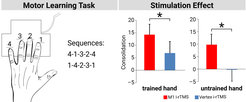Take a break! Brain stimulation improves motor learning
When exactly does the brain "remember" a newly learned motor sequence? Previously, it was assumed that the stabilization of learned motor processes does not begin until the exercise is complete and then runs for several hours. However, recent work shows that already short breaks within practice sessions shape later recall. "We wanted to understand how relevant the so-called consolidation or perpetuation in these short pauses during practice is for later recall, after several hours, and whether we can influence these processes with brain stimulation," said first author Jost-Julian Rumpf. The neurologist developed the study with healthy participants together with MPI researcher Gesa Hartwigsen. Participants had to type a simple sequence of numbers on a keyboard as quickly and accurately as possible. During practice, short pauses were taken after a certain number of trials and participants received magnetic stimulation of the brain during these breaks. The scientists wondered what was going on in the brain during the pauses – could it be that it was already learning at this point?

"The idea was to use magnetic stimulation to specifically influence the motor cortex during the short breaks between individual exercise units," reports Gesa Hartwigsen. It turned out that the brain stimulation during the short breaks improved recall of the learned number sequence when participants were tested six hours later. Although the participants had stopped practicing, the brain processed the practiced sequences more effectively if the brain had been stimulated during the short pauses within the training, presumably creating a stronger mental trace.
The researchers were also able to observe a so-called "transfer effect", from the trained hand to the other hand. "If we stimulated the brain in the breaks between the short exercise sequences, the trained sequence could be better recalled, not only with the trained hand, but also with the other hand," says the scientist.
Next, the researchers want to investigate the effects of their stimulation approach in older people who, in comparison with younger people, often have limitations in consolidation after motor learning and could, in the long term, benefit greatly from stimulation.












